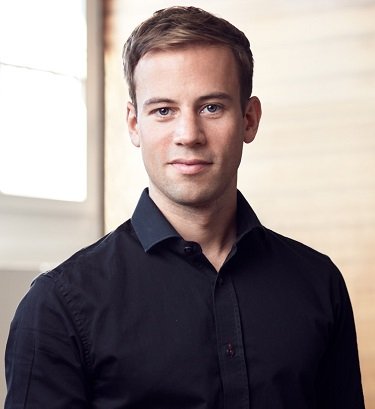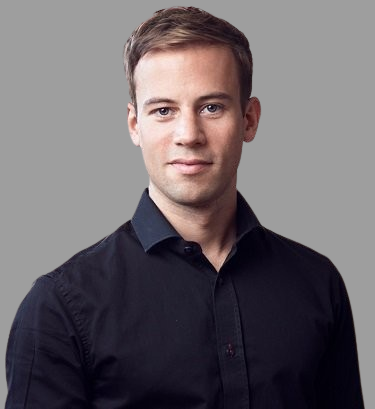Transforming Lives for the Better
A new generation of innovators has entered the stage of healthtech and they are ready to turn businesses upside down. While most companies in the industry still aim to increase profits while doing something good, leaders like Christoph try to do good while also making profits. “The way we measure success is fundamentally flawed. I want my work and the work of my team to be measured in terms of the positive impact we have on the world and our users. The number of units we were able to sell to them is just one indicator, definitely not the most important one.”
A firm believer in constant innovation and rethinking the status quo, himself a prime deliverer of breakthrough ideas, Christoph Bukhardt has been called “Germany’s best innovation psychologist” by the magazine Focus. So how does a psychologist end up becoming the CEO of a healthtech company? Born and raised in Germany, it was his Master’s thesis at the London School of Economics which brought Christoph to San Francisco the first time while he was researching the interplay of humans and the technologies they use. “If you really want to create solutions for the next generation of users you have to understand that technologies change how we live and think, and these changes dictate which technologies we are going to develop next”, he says. Christoph has been living in San Francisco, CA for a decade now and looks back at plenty of experiences turning technologies into successful business cases which make life better for their users. “I have always believed in the power of technologies to transform our lives for the better. Being an unconditional optimist when it comes to progress has always pushed me to understand emerging technologies and how they could be used to do good,” he says. In fact, his fascination with user-centric technologies and his background in cognitive psychology and data science have helped him and his team at OneLife to create a unique solution to provide clinically clean air with a smart, connected, and heavily data-driven air purifier. OneLife was developed with a mission to save lives while protecting the planet. “To us, the name represents the understanding that we only get this one life on this one planet. Both deserve protection, and with OneLife, there was our one chance to help solve a massive problem on a global scale: health starts with the air we breathe.”
Revolutionized Thinking
Having worked on the software and data side of businesses, Christoph’s interest in air purification only grew when he learned that nobody had upgraded the common air purifying technologies in the market in over 70 years. The entire world was cleaning air with a technology that was developed at a time when digital technologies did not even exist. “The more I learned about the necessity for air purification systems and the opportunities to save lives on a global scale, the more interested I became.” Ultimately, OneLife was born as a health technology provider with a deep belief in the value of data. Not surprisingly OneLife’s solutions use cutting edge sensors and automation algorithms “I knew we could revolutionize the way people thought about health technologies and we could disrupt an existing industry standard.”
OneLife X, as the device is called, purifies air at clinical levels without the need for loud, energy draining, and harmful technologies in outdated purifiers. It does not require filter replacement as the filter unit goes in the dishwasher repeatedly. That’s possible because OneLife uses a completely different technology. “Our filter is technically not really a filter. We create a plasma field, charge particles electrically and make them stick to a charged metal plate which can be cleaned easily. This, in a nutshell, is the idea behind the plasma filter technology,” states Christoph. The technology also requires hardly any energy and the ventilators run at very low speeds which means it is absolutely silent.
Drivers of Success
Though not being an engineer himself, Christoph has always enjoyed working with engineers and scientists. “Being different and thinking different are important drivers of our success. We combine outstanding engineering capabilities with a rigorous focus on user experience and user-driven design,” he points out. In fact, at OneLife, users are not customers; they are designers and developers of the next solution. In his opinion, users of solutions and customers are two different entities. Business goals today focus too much on the customer and how they can be sold the next thing, while really the value of a user lies in their contribution to how the next generation of products functions.
Moreover, the OneLife team strives to learn as much as possible about their users and their needs, understand how they live, what matters to them, and how the team can help make their lives healthier, increase their well-being and productivity. This also means taking care of the data needs of their users by partnering with other air quality data providers to get the most accurate and reliable data regarding air quality around the world.
The Collaboration of Human and Machine
Apart from being a health tech innovator and the CEO of OneLife, Christoph is also a TEDx speaker and has authored several books on the link between technology and impact innovation. His study on AI and its effects on human intelligence has brought out many unique revelations in healthcare. Though technology has transformed healthcare to a great deal, what is interesting is the effects it has on the humans using technologies. “Every technology changes behavior and with it, the expectations and needs of users change. Adapting to those changing needs is I think one of the biggest challenges coming from technology,” claims Christoph.
Today, as machine learning algorithms get applied to human health, they not only identify uncommon patterns but they provide help and warning signals before it is too late. “As an example, our systems warn users about pollen clouds coming their way, when it is safe to go on a run and when not to open windows. That’s only possible with complex algorithms provided by our partners. But in more general terms, you see augmentation of human abilities to predict and protect all over the healthcare industry,” explains Christoph.
From diagnosis to preventive treatments to new forms of health insurance, Christoph strongly agrees, the collaboration of humans and machines is driving progress and making things better for people. “This is one of the reasons why I prefer to call it augmented rather than artificial intelligence. We are using technologies to help our own understanding improve. We are augmenting our own capabilities. It’s not human versus machine. It’s humans with machines.” This means one of the biggest challenges for many in the industry will be the transition from providing products that solve problems to providing solutions that educate, inform, coach, and train users by increasing transparency and knowledge. “The key to solutions for the next decade will be their ability to influence human behavior.”
Facilitating Innovation and Growth
With a dream to create the conditions for healthy humans on a healthy planet, Christoph envisions OneLife to be an impact innovator with products that make people healthier while protecting the planet. This includes high performance health technologies without unnecessary power consumption, without wasteful replacement parts, made of recycled or fast-regrowing materials. Though the pandemic has been a major challenge to this progress, “I believe it will facilitate impact innovation and learning in the coming days.”
Apart from this, the pandemic has strongly increased the awareness on the side of users and customers with a shift towards prioritizing personal health over other factors in life. “Health is the new KPI for success in life, if you’re healthy you’re successful,” he affirms. Therefore, people now want to be part of communities to form healthy habits. They want to ride bikes at home but with others. They want to exchange ideas and health hacks online. They want to be recognized for their health initiatives. Healthtech companies have to understand that these communities are industry defining. Their needs drive new technologies not the other way round.
Next-Gen Leaders
“I am a careful listener. I learned over the years that it is crucial for leaders to listen,” opines Christoph. It helps him to have all the ideas and viewpoints on the table to make the best possible decisions. For him, leadership is about redefining and identifying the questions. Innovation happens when someone starts asking new questions. When everybody is asking the same question, it’s likely they’ll all come up with the same answers.
Though an introvert by nature, Christoph believes in building strong relationships at all times. In 2019, he published his most recent book, “Don’t be a robot – survival strategies for the age of artificial intelligence,” which talks about his business philosophy and understanding next generation leadership. Leaders need to be mentors to their teams and maintain relationships across company boundaries. “It is our job to define the purpose of a company and make sure that employees never forget that the only people we are working for are in the e community we are serving,” he ends.
Christoph’s Key Principles
- Learning from mistakes is more powerful than not making them
- Everything is evolution, it never ends, you will have to adapt constantly
- Ideas don’t matter that much, whether you can execute them within a certain market at a certain moment in time is what matters
- Focus on the community you are serving not the products you’re developing
- Don’t be a robot. If you act like a machine, you will be replaced by one

Company: OneLife GmbH
Website: www.onelife.eco
Management: Christoph Burkhardt, CEO
Founded Year: 2018
Headquarters: Mönchengladbach, Germany
Description: German based Healthtech/Clean Air company provides smart Indoor Health Ecosystem engineered to save lives and protect the environment.




